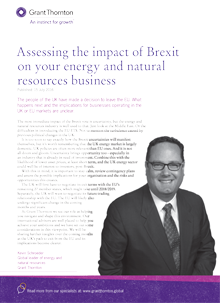-
Privacy and Data Protection
Our digital risk team is made up of a combination of subject matter experts and technical specialists who can help your business comply with the GDPR.
-
Governance, Risk and Compliance (GRC)
While business goals and strategies evolve, our services support you wherever you are in your business cycle. The digital economy is simultaneously increasing the magnitude of new business opportunities while increasing the difficulty of getting it right.
-
ISO 27001 and ISO 27701
Grant Thornton’s ISO 27001 and ISO 27701 specialists will arrange and oversee the formal audit process.
-
SOC 1,2,3
As a service organization there are many ways to provide assurance to your customers and in turn other stakeholders over your control environment. One of the most effective and cost-efficient ways is to issue a Service Organization Control (SOC) Report.
-
Incident Response
Grant Thornton’s Cyber Incident Response Team can support your business in the event of a cyberattack or data loss event. We work alongside your existing IT and Legal teams to provide a co-ordinated, timely and efficient investigation and remediation.
-
Hacking Services
At Grant Thornton, our cyber security experts can develop a bespoke penetration testing plan to meet your business needs and unique IT environment. We can undertake the full suite of testing or conduct individual assessments, as required.
-
Cyber Health Check
Approximately 54% of organizations report that they have experienced at least one cyber-attack during the past year. Grant Thornton’s cyber health check provides you with an objective, jargon-free assessment of your current cyber security, drawing on both qualitative and quantitative elements.
-
Dark Web Threat Intelligence
We use a variety of dark and deep web monitoring tools that continuously scans illegal sites to discover any mention of your data, ranging from breached security credentials such as usernames and passwords to leaked confidential documents of your company.
-
Digital forensics and electronic discovery
We offer a full suite of digital forensics and data acquisition services in investigations related to cybercrime, disputes, fraud and regulatory investigations.
-
Insolvency
If you're facing a time of personal or corporate financial crisis you need advice from someone who listens, who understands your specific issues and deals with them in a supportive and sensitive manner.
-
Crisis stabilisation and turnaround
In periods of financial distress, management teams often face considerable challenges, with many directors having little or no experience of similar conditions.
-
Operational and financial restructuring
Companies challenged by underperformance often need support in identifying options for financial or operational restructuring. Tapping this type of advice helps them create a stable platform for business turnaround.
-
Accelerated M & A
Even fundamentally sound businesses run into difficulties. Cash flow can come under pressure from the loss of a big client, or a dip in performance can threaten a breach of banking covenants if there is insufficient headroom.
-
People Services
Our HR Outsourcing solutions are designed to provide you with the flexibility and expertise needed to manage your people effectively and efficiently.
-
Relocation made easy!
We bring to the table our in-depth understanding of Cyprus immigration legislation and policies, coupled with long experience supporting corporate clients relocating non-EU staff to Cyprus, as well as entrepreneurs and executives moving with their families.
-
Family Office Services
In an era of rising digital threats, protecting the sensitive information and assets of high-net-worth families is paramount. In collaboration with our dedicated strong Cybersecurity and Data Protection team, we can help ensure the data security and privacy of your Family Office (employees and c-suite), family members and any staff supporting them, and also trusted associates.
-
Client Vacancies
As part of our People, Relocation and Family Office Services, we support our clients in finding talent to meet their unique needs. Here, you’ll find open positions available within our clients’ businesses across a variety of industries. Browse the opportunities below to see how you can become part of their teams!
-
Indirect Tax
Our experienced VAT specialists are available to assist companies and entrepreneurs of all industries and sizes in meeting their obligations.
-
Direct Tax
We can help you ensure a bespoke balance between tax compliance and effective tax planning for your special circumstances.
-
Ημερίδα Γνωριμίας με την Grant Thornton Κύπρου
Σας προσκαλούμε σε μια μοναδική ευκαιρία να γνωρίσετε την Grant Thornton Κύπρου! Την Τρίτη, 5 Νοεμβρίου 2024, θα έχετε τη δυνατότητα να συναντήσετε την ομάδα μας, να ενημερωθείτε για επαγγελματικές ευκαιρίες και να εξερευνήσετε πιστοποιήσεις όπως ACCA.
-
Life at Grant Thornton
At Grant Thornton Cyprus, we are taking a holistic approach and reimagining the way we work, continually assessing it and making necessary changes to better support our people.
-
In the community
Unlocking the potential for growth in our local communities.
-
Diversity and inclusion
Diversity helps us meet the demands of a changing world. We value the fact that our people come from all walks of life and that this diversity of experience and perspective makes our organisation stronger as a result.
-
Global talent mobility
One of the biggest attractions of a career with Grant Thornton Cyprus is the opportunity to work on cross-border projects all over the world.
-
Learning and development
At Grant Thornton we believe learning and development opportunities allow you to perform at your best every day.
-
Our values
We are a values-driven organisation and we have more than 56,000 people in over 140 countries who are passionately committed to these values.
The people of the UK have voted to leave the EU. But what does this mean for organisations in your industry?
While each industry will be impacted differently, all face increasing uncertainty. It is important that you stay calm, review contingency plans and assess the possible implications – there will be risks and opportunities from this decision.
We see our role as helping you navigate and shape this environment, and our international advisers are well placed to help you achieve your ambitions. These viewpoints outline key considerations for organisations working in the following industries: energy and natural resources, financial services, healthcare, not for profit, public sector, real estate and construction, and technology, media and telecommunications.
We will be sharing further insights over the coming months as the UK's path to exit from the EU and its implications become clearer.
Energy and natural resources
The most immediate impact of the Brexit vote is uncertainty, but the energy and natural resources industry is well used to that.
It is too soon to say exactly how the Brexit uncertainties will manifest themselves, but it’s worth remembering that the UK energy market is largely domestic. UK policies are often more relevant than EU ones. Uncertainty can bring opportunity – especially in an industry that is already in need of investment. Combine this with the likelihood of lower asset prices, at least in the short term, and the UK energy sector could well be of interest to investors, post-Brexit.”
Kevin Schroeder - Global leader of energy and natural resources
Financial services
Financial services organisations should calmly map and assess the specific implications for their business against the changing landscape. We believe initial work should focus on two broad areas:
Reviewing the regulatory impact (principally ‘passporting’). In particular non-EU financial services companies currently using the UK as a gateway to the EU will need to monitor the situation closely.
Assessing the impact on the macro economy of the UK and the remaining EU 27 member states. In particular, financial services organisations should consider their exposure to medium term sterling and Euro volatility; how exposed their business model are to the EU; what protective measures need to be put in place; and how to manage customer communication.
Chris Tattersall - Global leader of financial services
Healthcare
The decision to exit the EU by UK voters’ will likely mean changes for the NHS (National Health Service), pharmaceutical companies, the drug approval process, and others. While it is impossible to determine the full scale of the impact, we anticipate some of the following areas will be effected:
Regulatory upheaval: the UK would no longer be part of the EU's centralised regulatory and market authorisation process. There are a number of complications associated with this including delayed drug approvals and an increased compliance burden.
Decreasing research funding: approximately 16% of funding for UK life sciences companies comes from EU research grants. Brexit could sever this funding stream.
Access to talent: both the NHS and pharmaceutical companies face this challenge. The NHS will increasingly struggle with access to affordable talent, while pharmaceutical companies could see scientists emigrating elsewhere in the face of increased regulation and decreased grants.
Anne McGeorge - Global leader elect of healthcare
Not for profit
The not for profit sector is varied, there is no one-size fits all and a wide range of relationships exist internationally and with the EU. The sector benefits hugely from the free movement of talent, increased connectivity and access to funding that EU membership brings and will want to protect those relationships. We believe the sub-sectors could be impacted in the following ways:
Charities: organisations dependent on EU grants must establish alternative sources of funding.
Higher education: has well-established international collaborations and must consider alternative research funding streams, which could impact talent recruitment.
Social housing: impacts will vary depending on their reliance on overseas investment, labour from Europe and the exposure to market sales. The sector relies heavily on funding from the institutional financial system and, more recently, the European Investment Bank (EIB).
Carol Rudge - Global leader of not for profit
Real estate and construction
Brexit uncertainty sent a ripple across Europe and other major global markets. As the fifth largest economy there are strong correlations between the health of the UK and other countries. From a real estate and constructive perspective we are starting to see negative effects on UK house builders – first by possible future shortages in skilled migrant workers and second by restrictions on homeowner mortgages.
The immediate impact of Brexit was to put many transactions on hold – some may even be aborted. Listed UK property companies also saw significant falls in share price value but with tentative recoveries. But all in all the UK real estate market remains strong and we’ve already seen increased interest from opportunistic investors. Market volatility caused by the Brexit announcement may well continue, but it's worth remembering that volatility also creates opportunities.
Sian Sinclair - Global leader of real estate and construction
Technology, media and telecommunications
The result of the referendum was a disappointing one for the technology, media and telecoms (TMT) industry. Surveys show that three-quarters of the UK technology community favoured staying in the EU. And soundings of the UK telecoms sector reveal a general belief that Brexit will fundamentally affect a broad spectrum of business and society.
Uncertainty will be the watchword as companies and communities around the world monitor what promises to be a multi-year process of separation. But in the face of this upheaval, it is important to stay calm, review your contingency plan and review the risks and opportunities this creates.
Steven Perkins - Global leader of technology, media and telecommunications
Public sector
Despite the current uncertainty, one thing is known – the financing of public services over the medium term is inextricably linked to the strength of the British economy. Since Brexit was announced, the UK government has abandoned its target to restore government finances to a surplus by 2020. In a post Brexit world, the following five factors are under the microscope more than ever: government policy, access to funding, overseas aid, impact on international institutions and access to talent.
Scott King - Global leader of public sector







